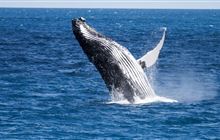Public asked to avoid dead whale near Dunedin
Archived content: This media release was accurate on the date of publication.
Introduction
The public is asked to steer clear of the humpback whale carcass which has washed up on a Omimi beach, near Warrington, north of Dunedin.Date: 29 July 2022
The carcass of the 9.7 m long juvenile humpback was first seen floating off the coast of Warrington on 15 July. On 22 July it was found washed up at a remote Omimi beach.
It was thought the whale might wash back out to sea in heavy swells this week, however it has remained beached. It is likely to stay beached while it decomposes, which could take several months.
DOC biodiversity ranger Jim Fyfe says people should stay away from the whale to respect the privacy of neighbouring landowners and because of the health risks it poses.
The most direct access to the beach crosses private property and the landowners are not able to accommodate people wanting access to see the whale, he says.
“Decomposing whales can be a health risk, as they are mammals and carry bacteria and diseases which can be passed on to people.”
The whale is being left to decompose because the site is difficult to access by land or water, meaning it’s not practical to remove or bury the carcass.
Jim Fyfe says swimmers and surfers also need to be aware there could be a greater chance of shark encounters in the wider area, such as at Warrington Beach and nearby surf breaks, because of the whale.
“While we have not seen any evidence of increased shark activity in the area, research has shown that sharks may remain near beached whale carcasses in search of food.”
DOC and Kati Huirapa Rūnaka ki Puketeraki, the local rūnaka, will monitor the decomposition of the whale.
DOC staff will also be meeting with the Warrington Surf Life Saving Club to discuss risk assessment when planning events in the lead up to summer.
A DNA sample has been taken from the whale. The cause of death is not known.
Humpback whales may be found off the Otago coast between May and July as they migrate north away from the cold Antarctic waters. However, it is unusual for them to wash up.
Contact
For media enquiries contact:
Email: media@doc.govt.nz

